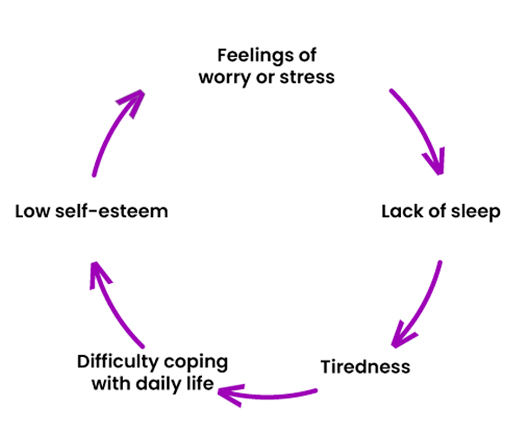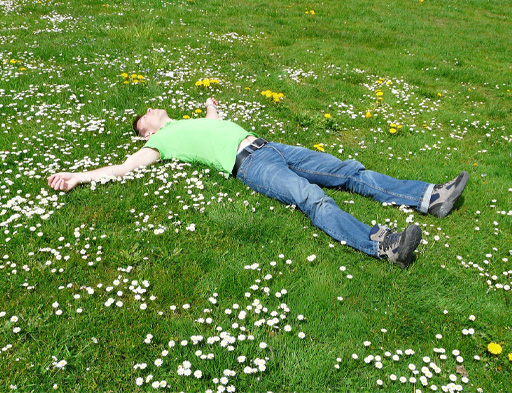4.4 Sleep
Sleeping well is essential for managing stress, coping with daily demands and maintaining mental and physical health. Living with a mental health problem can affect how well you sleep, for example anxiety can cause repetitive thoughts and worries. Depression and seasonal affective disorder can make you want to sleep more; staying in bed for longer or sleeping more often, but depression can also cause insomnia (Mind, 2020). Sleep problems can create a vicious cycle of poor mental health, which is exacerbated the more sleep problems continue, as depicted in the following diagram adapted from Mind (2020).
Sleep allows your brain and body to rest, recharge and self-repair. Lack of sleep, or poor sleep, directly affects mood, patience, resilience and overall feelings of wellbeing. The sleep-wake cycle is affected by circadian rhythms, 24-hour cycles that are part of the body’s internal clock. Different systems of the body follow circadian rhythms which are synchronised with a biological clock in the brain. This internal clock is directly influenced by light, and when properly aligned, a circadian rhythm can promote consistent and restorative sleep, and similarly when the circadian rhythm is misaligned, insomnia can ensue (Sleep Foundation, 2023a). Research has shown circadian rhythms have an integral role in aspects of mental health (Brainard et al., 2015).
Good-quality sleep is influenced by sleep hygiene, which involves creating appropriate environments and routines to promote consistent, uninterrupted sleep. You can read more in this Sleep Foundation resource Why Do We Need Sleep? (2023b).
Activity _unit9.5.4 Activity 10 Sleeping well
Watch the video 5 Simple Tips For Getting a Good Night's Sleep.
In your reflective diary note down how many hours sleep you got last night and the typical amount each night over the last week. How easy was it to get to sleep/wake up? What is your typical sleep routine? Identify three steps that you could take to improve your sleep
Discussion
Sleep research has shown that developing a good night-time routine can enhance sleep, for example switching off all electronic devices at last an hour before bed, taking a warm bath, and avoiding large meals, caffeine and alcohol before bedtime. Good sleep quality can also be improved through ensuring your bedroom is quiet, dark, relaxing and at a comfortable temperature. Try keeping a sleep diary for a week, including your learning for effective sleep hygiene from this course, and review how you can make long-term changes to help improve the quality of your sleep.


